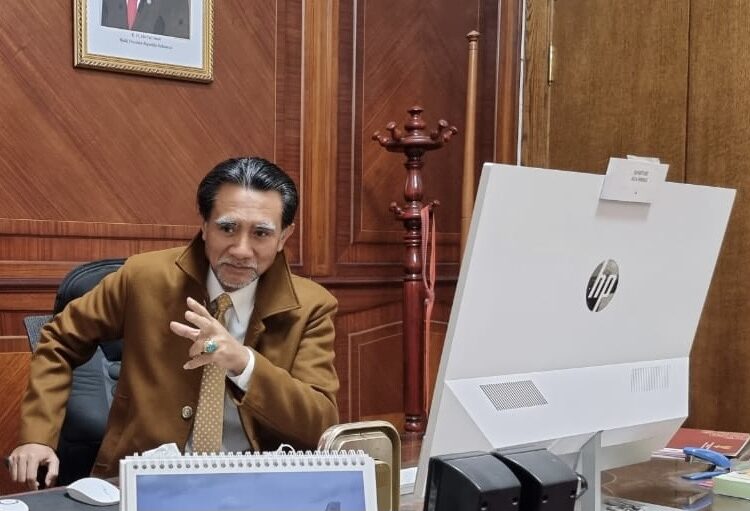Since Egypt and Indonesia established diplomatic relations in 1947, the two countries continue to work together for more partnerships, developing bilateral cooperation for mutual benefit and a better future.
In his interview with the Egyptian Mail, Indonesian Ambassador Lutfi Rauf hailed the investment climate in Egypt and the economic reforms. He touched upon bilateral cooperation in fighting terrorism and the role of Al-Azhar in strengthening Egyptian-Indonesian ties, in addition to trade and investment between the two countries.
Investment
“I am pleased to note the latest developments in the Egyptian economy, including the investment climate, which is quite stable and has promising prospects even in the midst of the Covid-19 pandemic,” Ambassador Rauf said.
Standard Chartered Bank in its report predicts an increase in Egypt’s GDP ranking from 21st in 2017 to 7th in the world in 2030. Moody’s, S&P and Fitch maintain Egypt’s rating with a stable outlook.
He added that Egypt is the one and only country in the region which has a positive GDP growth — 3.6 per cent for the period 2019-2021 and 3.3 per cent for 2020-2021, according to World Bank data.
In an effort to reform the economic sector, Egypt has implemented a number of regulatory reforms, including a new investment law in 2017, a new company law and a bankruptcy law in 2018, and a new customs law in 2020.
“These laws aim to improve Egypt’s investment and business climate and help the economy realise its full potential,” Ambassador Rauf said.
“Indonesian investment in Egypt up to the end of 2020 reached $11 million in 20 companies,” he added.
The ambassador pointed out that the value of Egyptian investment in Indonesia in 2020 has reached $400,000 with 30 projects. An increase of 166.67 per cent compared to the same period in 2019 which was only $150,000 in 15 projects. During the period 2010-2020, Egyptian investment in Indonesia amounted to $6.35 million.
Fighting terrorism
Ambassador Rauf said that Indonesia, as well as Egypt, has been a victim of terrorism, therefore, both countries are committed to combat terrorism at all fronts.
He added that his country’s cooperation with Egypt in this field “is already at an advanced level” with a Memorandum of Understanding (MoU) between the National Counter Terrorism Agency of Indonesia and the Ministry of Interior of Egypt on Counter-Terrorism Cooperation signed on 26 February 2019.
“This framework serves as a platform for the relevant agencies to share information, policies, and strategies pertaining to counter terrorism as well as to build each other’s capacity through joint training and workshops,” he said.
In 2020, the Joint Committee under this MoU had met virtually to discuss future collaboration and follow ups to implement this document.
“One of the possible areas of cooperation is to engage Al-Azhar Observatory for Combating Extremism, to provide us with counter-narrative with regard to any misinterpretations regarding the religion of Islam and Islamophobia. Furthermore, we believe that partnership with the respective institution will boost our efforts to spread the value of wasathiyah (moderation) and Islam as religion of peace, tolerance, and moderation.”
Al-Azhar
As the oldest Islamic University in the world, Al-Azhar University plays a significant role in strengthening the Egyptian-Indonesian relationship, even before the independence of Indonesia, Ambassador Rauf said.
“At the moment, we have more than 10,000 Indonesian students studying at Al-Azhar University. This number is the biggest number of international students in the region. They come from different provinces in Indonesia with diverse cultural, educational, and social-economic backgrounds,” he said.
The Ambassador added that the graduates of Al-Azhar play a significant role in society in government and non-government organisations in education, religion, social, economic, and trade.
“Most importantly, Al-Azhar graduates hold the position of Al-Azhar Ambassadors with the duties of spreading the principles of moderate Islam with the aims of fostering harmony among the diverse ethnic groups in the country and providing a counter-balance to extremism and extremist as it is taking place in various parts of the world,” he said.
Trade
Despite the pandemic, Ambassador Rauf said, the total trade volume between the two countries is showing positive growth. “Within the period January-August 2021, bilateral trade between Indonesia-Egypt increased 47,5 per cent to $1,12 billion, if we compare to the same period 2020 amounted to $761 million,” he said.
Indonesian exports to Egypt, increased 46,7 per cent, amounted to $980 million. Egyptian exports to Indonesia, increased 53,0 per cent, amounted to $142 million.
Main Indonesian export commodities to Egypt are palm oil, coffee beans, artificial yarn, tyres, wood fibre, cars, paper, processed foods, coconuts and rubber. While the main Egyptian export’s commodities to Indonesia include phosphates, dates, molasses, citrus fruit, surgical instruments, asphalt, olive oil, electrical appliances, nuts, and natural honey.
Date forum
Ambassador Rauf visited New Valley in the southwestern part of the country to attend the first Egyptian Date Marketing Forum (Oct 16-18, 2021). It was held under the patronage of President Abdel Fattah El Sisi and organised by the Ministry of Trade and Industry.
“My first visit to the New Valley was phenomenal as I witnessed such raw culture of the Bedouin and the beautiful dunes of the New Valley,” he said.
“Everything about New Valley was an unforgettable experience. Moreover, it was my honour to attend the prestigious event,” he added.
Indonesia is one of the largest importers of Egyptian dates in the world, he said, stressing that the Covid crisis has undoubtedly affected exports worldwide.
The ambassador has unforgettable memories of New Valley.
“I had the honour to plant a palm tree as a symbol of our cooperation and brotherhood,” he said.






Discussion about this post